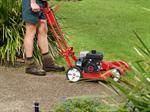Green Keepers and Turf Managers
 Green keepers are primarily concerned with maintaining, and sometimes establishing, lawns and sports turf surfaces in home and public gardens, golf courses, bowling greens and other playing fields. They may also need to maintain gardens, trees, landscape features or other facilities associated with a turf area.
Green keepers are primarily concerned with maintaining, and sometimes establishing, lawns and sports turf surfaces in home and public gardens, golf courses, bowling greens and other playing fields. They may also need to maintain gardens, trees, landscape features or other facilities associated with a turf area.
Where They Work
Green keepers and turf experts work at golf
courses, horse racing tracks, football grounds and other playing fields,
lawn tennis courts, croquet rinks, lawn bowling rinks, turf farms
(providing instant turf or sod), lawn seed companies, schools and
universities, tourist resorts, turf research stations or anywhere else
where a quality turf is required.
-
Larger facilities such as a major sporting complex or golf course usually employ green keepers, assistant gardeners, supervisor, and perhaps a superintendent or turf manager to head up one or several teams of people involved in turf care.
- Smaller facilities such as bowling clubs employ fewer staff, sometimes only one green keeper or turf manager who needs to be a “jack of all trades” and do everything from routine turf maintenance to handyman work on the
 clubhouse.
clubhouse.
- Private and commercial gardens often use lawn mowing contractors and specialist turf companies to undertake routine maintenance and renovation or troubleshoot extraordinary problems when they arise.
What They Do
Work tasks can include mowing,
fertilising, spraying for weeds, dealing with pests and diseases, hand
weeding, topdressing, repairing damaged areas, irrigation, and using
tools or machinery for edging, aerating, raking, vacuuming, renovating
or other jobs. Certain types of turf need special preparation before
use (e.g. playing fields or running tracks need the grass to be line
marked, a turf wicket may need rolling, and covers used to keep water
off the playing surface). Irrigation and water management can include
hand watering, laying drainage systems, sand slitting during a playing
season, using machines to sweep or soak up excess surface water,
cleaning and maintaining drainage and irrigation systems.
What is Needed
Green keepers need a broad foundation in horticulture (commonly 600 hours or more of formal training) to understand soils, turf plants, fertilisers, weed and disease control, and water management. Organisational skills are an asset in this job. Turf managers also work with the people who use the turf i.e. club members and club committees - this requires great communication skills.
Many people will start in a position where they are studying while working and
gaining experience. The course they undertake may be a certificate,
diploma, or perhaps (only in some countries) an internship or
apprenticeship.
Opportunities
The turf industry is a significant employer
within horticulture. There are (in most developed countries) an enormous amount of sporting facilities that need to be maintained.Turf grass that gets used more will be damaged more, and require more
manpower to maintain. Premium, high profile facilities that are used for
televised sporting competitions are always in need of highly skilled
green keepers. The best greenkeepers have the opportunity to eventually
work at such facilities, and earn a premium income.
Sometimes the first job may be as a volunteer at a local
sporting club who rely partly of volunteers to cut costs. Sometimes this voluntary work can lead to eventual employment opportunities or a career. Green keepers who have empathy, good communication
skills, a natural ability to prioritise and organise themselves are
more likely to progress through the ranks to become a technician,
supervisor, manager or superintendent.
CHOOSING A COLLEGE
Every college offers something different.
- They all have different tutors, with varying qualifications and experiences.
- Some have higher course fees; but that could be because they offer more extensive support; while others may charge less but provide less services. Some may offer different payment plans to others.
- The style of teaching and learning; as well as the emphasis upon assessment and the way work is assessed can vary from one college to the next.
The best school for one person might not necessarily be the best for the next. You need to look closely not only at what you want to study; but the people and services you will be working with; and then choose something you think will work for you.
MORE ADVICE
Use our FREE COURSE & CAREERS ADVISORY SERVICE (click)
More from ACS
Ebook - Advice from professional horticulturists with decades in the industry.
View eBook
Ebook - Growing and using grasses and grass like plants: identify, cultivate illustrated encyclopedia
View eBook